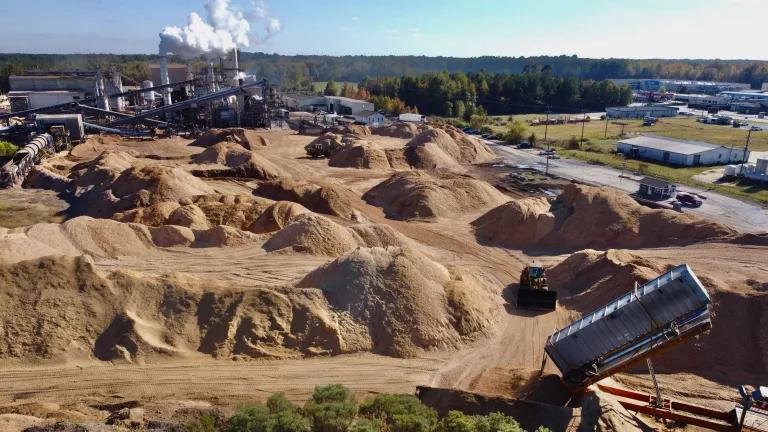
After a string of long days, late-night committee hearings, fact sheets prepared, opponents' claims debunked, and unprecedented engagement from Californians up and down the state, the State Legislature completed business for 2015 and sent hundreds of bills to Governor Brown's desk. NRDC and our partners in public health, clean energy, business, labor, and other environmental and environmental justice groups successfully advocated for several strong bills that are now awaiting action from the Governor. These bills raise the bar on clean energy, energy efficiency, public health, and protection of our communities and natural resources, and can be models for other states and nations. There is always more work to do, and passing legislation requires some level of compromise; but overall it was a very good year for California's environment and public health. See below for summaries of some of the key environmental and public health bills.
Advocates stand with Senate climate champions on the final day of the 2015 legislative session
Bills on the Governor's Desk include
Climate and Clean Energy
SB 350 (De León and Leno) - Sets California on a course to generate at least half of its electricity from clean, renewable resources and double energy efficiency gains throughout the economy within the next 15 years. Contrary to reports that all petroleum reduction provisions were dropped from the bill, SB 350 directs the electric industry to accelerate the widespread electrification of the transportation sector. Together, these measures will slash carbon pollution in the power sector nearly 40 percent below 2020 forecast levels, equivalent to avoiding the annual carbon pollution from more than 6 million cars.
AB 802 (Williams) - Allows utilities to provide incentives to customers who improve their buildings up to the current building code and beyond. Also allows building owners and tenants to determine the most effective efficiency and renewable energy building improvements through improved tracking and benchmarking of energy use.
AB 1288 (Atkins) - Adds two members to the Air Resources Board to represent low-income communities that bear the brunt of pollution and climate change impacts.
AB 693 (Eggman) - Creates a new program to provide financial incentives for solar installations at multi-family affordable housing properties.
AB 1496 (Thurmond) Requires the Air Resources Board to monitor methane emissions hot spots in California and take actions to reduce methane emissions.
SB 185 (De León) Prohibits California's public pension systems, CalPERS and CalSTRS from making new or additional investments in coal companies.
SB 414 and SB 295 (Jackson) and AB 864 (Williams) - This package of bills improves state and local agencies' ability to prevent and respond to oil spills in a timely manner. The package was developed in response to the devastating oil spill at Refugio Beach, near Santa Barbara, which was not detected for several hours.
AB 744 (Chau) - Reforms parking regulations to reduce unnecessary parking spaces and promote affordable housing near transit.
Public Health
SB 27 (Hill) - About 70 percent of all medically important antibiotics sold in the U.S. are for animals. If signed, SB 27 will be the first bill in the country to curb overuse of antibiotics in meat production, and will help protect the efficacy of precious antibiotics.
SB 673 (Lara) and AB 1075 (Alejo) - Strengthen permitting and enforcement criteria for hazardous waste facilities.
Wildlife and Natural Resources Protection
AB 96 (Atkins) - Closes a loophole in California's ivory law that allowed sale of pre-1977 ivory. A report commissioned by NRDC earlier this year found that a significant portion of ivory for sale in the state is likely illegal, but since it is nearly impossible to distinguish new from old ivory, enforcement is difficult. AB 96 would close the pre-1977 loophole and ensure that ivory from rhinoceros horns is also covered by the ban.
AB 888 (Bloom) - Prohibits the use of plastic microbeads in personal care products sold in California. Microbeads are tiny bits of plastic used in products such as toothpaste and facial cleansers that wash down drains and into waterways where they pollute our oceans and harm wildlife.
Drought and Water Efficiency
SB 555 (Wolk) - Requires urban water suppliers to annually audit and report on water losses throughout their systems due to leaky pipes, joints and valves.
Good Government and Voting Rights
AB 1461 (Gonzalez, Alejo and McCarty) - Removes barriers to voting registration by providing every person who has a California driver's license or ID card with automatic voter registration unless he or she opts out.
Unfinished Business
A few bills and issues were introduced this year, but did not move all the way through the process, and will be revisited next year. Some of the key environmental priorities include:
Transportation Special Session - Governor Brown called a special session of the legislature to consider and act upon legislation to provide funding for transportation and other critical infrastructure. My colleague Amanda Eaken describes here how the state should use this opportunity to cut our petroleum dependence, clean up our air, and provide real transportation choices.
SB 32 (Pavley) Affirms California's climate targets for 2030 and 2050.
SB 248 (Pavley) Requires regulatory updates and greater transparency with regard to oil and gas drilling injection wells.
SB 788 (McGuire) Closes a loophole in state law that could allow oil drilling off the Santa Barbara coast.
The Governor has until October 11 to sign or veto the bills on his desk. If you would like to contact the Governor about any of these bills you can fill out a comment form here.


